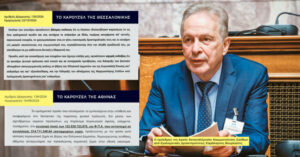Battle with “carousel”-type criminal organizations, which have been coming to light one after the other lately, is being fought by the Ministry of Finance and the relevant auditing authorities, as it’s estimated that the state loses up to 2 billion euros annually due to fake invoices and fraudulent transactions, leading the Treasury to pay VAT – instead of collecting it – to these fraudsters.
Two reports by the head of the Anti-Money Laundering Authority, honorary Deputy Prosecutor of the Supreme Court Charalambos Vourliotis, reveal two major tax evasion cases in Athens and Thessaloniki.
Experienced officials in law enforcement mention that such cases are only “the tip of the iceberg” as hundreds of fraud rings have found the “money-making machine,” collecting billions of euros from the public purse with “carousel” scams. By establishing shell companies and using “front men,” they claim to be conducting exports, which exist only on paper, to produce fake invoices and collect VAT, hide profits, and unlawfully obtain subsidies.
The lion’s share is thought to be taken mainly by cross-border “carousel” fraud schemes. According to sources quoted in “TO THEMA,” from 40 blatant cases of companies flagged for investigation due to suspicious exports to EU countries (with monthly turnovers of 10, 30, or even 40 million euros!), the state loses revenue or refunds VAT amounting to over half a billion euros annually. The total unrecorded losses for the state from similar rings across the country are estimated by Finance Ministry officials to reach or even exceed 2 billion euros a year.
Moreover, the offices of Greek Authorities have received documents from foreign countries (such as Bulgaria, among others), indicating specific Greek companies of various types (primarily in mobile phone trading, agricultural products, or pharmaceuticals) that report bulk shipments, which, however, arrive empty at their destinations.
The “Front Men”
The “disappearing trader carousel” is perhaps the most widespread form of this fraud, focusing on VAT, where unscrupulous traders exploit legal loopholes both on a national and European level to avoid paying it. Carousel fraud is based on creating a network of companies usually located in different EU countries. These companies, though seemingly legitimate, operate solely to facilitate fraud, after which they vanish like ghosts.
Within the network, fake transactions involving goods, often of high value, are conducted. Invoices are issued, but the goods never change hands. The companies purchasing these goods declare the VAT they paid and request a refund from the tax office. However, the “disappearing trader” who sold the goods does not remit the VAT they collected, as their company has been dissolved or relocated to another country.
After completing the fake transactions and collecting the VAT, the company that sold the goods and is obligated to pay the VAT disappears. Its owners vanish, offices close, and bank accounts are emptied.
And even when the movement and sale of goods are genuine rather than fake, dozens or hundreds of shell companies are interposed to siphon off VAT from the state, which is then shared among the ring members.
The fraud typically follows five steps:
“Straw men”: Most often, a middleman is used, who purchases products from suppliers in Greece or imports them from third countries like China, declaring that they are intended for intra-community delivery to another EU country (e.g., Bulgaria).
VAT exemption: Since it is an intra-community transaction, no VAT is paid in Greece. Regulation 42 allows this exemption when products are transported from one EU country to another.
Fake export: The trader claims the products will be sent, for example, to Bulgaria or another EU country. In reality, these are only exported on paper. Sometimes, to cover their tracks, they hire trucks to make it seem that the goods crossed the border as transit, but these trucks travel empty while the goods remain and circulate in Greece, circumventing VAT controls.
Sale without VAT: The products are sold in the Greek market without VAT at 24%, giving them a price advantage over competitors who follow the rules.
Disappearance of the trader: In the final stage, when the ring decides it has closed its loop or feels it is under scrutiny and threatened, it shuts down the business that owes VAT and taxes to the state. The trader “disappears.” Then, another shell company is established using fake addresses and bogus information.
In one such case, for example, a clothing and footwear trading company took advantage of Regulation 42 to secure VAT exemption for intra-community transactions. The audit found that this company had registered a fake address while it was transacting with a company in Bulgaria to avoid paying VAT.
The company imported clothing and footwear from China, which arrived in Greece. They remained in the country, despite customs declarations stating they were destined for Bulgaria. To make the scheme more convincing, the Bulgarian company transferred funds equivalent to the value of the goods into a bank account allegedly belonging to the company based in Greece.
However, the products were sold in the Greek market without being subject to 24% VAT, making them significantly cheaper compared to products that are properly imported and taxed. Additionally, the collaborating customs broker failed to prove the origin of the funds used to pay the duties (150,000 euros) on products imported from China.
How the 35 million euro fraud was set up in Thessaloniki’s carousel
One of the largest financial fraud cases in recent years, with illegal profits amounting to 35 million euros, has become the focus of revelations involving well-known figures from Thessaloniki’s business and political scene. Businessman Christos Karathanasis and former MP of the Potami party Alexandros Chatzidimitriou are reported to be at the core of a “carousel”-type ring, using shell companies in Greece and abroad to evade VAT and income tax, illegally obtain tax refunds and EU subsidies for alleged purchases from ghost companies, as well as to launder money by mixing legitimate and “dirty” funds from other criminal activities and theft.
The revelations of the Anti-Money Laundering Authority, led by Mr. Charalambos Vourliotis, also implicate members of Mr. Karathanasis’ family, an officer of the Hellenic Police, and other businessmen who had established shell companies. The Authority’s order freezes all assets of those involved, from bank accounts to luxury properties and high-end cars, such as Bentley, Porsche, Audi, and BMW, used by the ring members.
Bulgaria – Great Britain
According to the findings of the Anti-Money Laundering Authority, as revealed by “Proto Thema,” businessman Christos Karathanasis, his relatives, and seven others involved in the case, along with numerous companies they established or represented, are alleged to have committed the offenses of tax evasion, fraud in conjunction with and repeatedly against the Greek State, fraud against the EU, embezzlement, theft, and money laundering from criminal activities. Former MP of Potami, Alexandros Chatzidimitriou, along with six others mentioned in the detailed report, faces charges of complicity.
In this case, it appears that the network used the “carousel” scheme via virtual or “disappearing” merchants as a “money-printing machine,” facilitating VAT refunds worth tens of millions. The report outlines how they attempted to launder the illicit funds that “burn” in the hands of their holders.
Specifically, businessman Christos Karathanasis allegedly engaged in illegal commercial activity through companies he and his associates set up, accruing financial gains by withholding VAT and reducing income tax. His company, Royal Sugar ABEE, in addition to its legal activities, has reportedly conducted transactions for years involving fictitious domestic companies as intermediaries for intra-community transactions and foreign companies located in at least two EU member states (Bulgaria, the UK). According to the Authority’s report, this resulted in VAT revenue losses exceeding €10 million.
The total unlawfully withheld VAT amount is estimated at a minimum of €23,496,719.51, with €10,984,882.19 of intra-community VAT unremitted, causing equivalent damage to the EU. Additionally, the businessman is found to have unlawfully embezzled a total of €1,642,750.08 from national and EU funds through fake declarations submitted by these fictitious companies.
The Anti-Money Laundering Authority’s report notes that an ongoing judicial investigation is underway against Christos Karathanasis and other individuals involved, examining their role in the embezzlement of equipment and aggravated theft from the factories and warehouses of the Hellenic Sugar Industry in Platy, Imathia, and in Serres.
The illicit profits reportedly earned by Karathanasis and his family are estimated at a minimum of €8,700,000. Thus, the total confirmed economic crime proceeds amount to at least €34,289,469.59, excluding additional tax losses for the Greek State from income taxes, estimated at 45% or more on these amounts.
The Former MP
The report’s author provides detailed analysis on the network’s operational methods and further explains the involvement of Alexandros Chatzidimitriou, a former Potami MP and ex-president of the Serres Cooperative Bank (later Central Macedonia Bank and now Pancretan Bank).
According to the report, Karathanasis’s long-term and carefully planned criminal activities used banks in Greece and abroad to lend legitimacy to their transactions with fictitious companies, thereby laundering the profits. The former Serres Cooperative Bank facilitated these transactions, allowing Karathanasis to transfer funds for alleged purchases from fictitious companies in Greece and receive funds from both domestic and foreign fictitious companies of unknown origin.
The report claims that Karathanasis chose the Cooperative Bank of Serres due to close ties with its board members, including Alexandros Chatzidimitriou, who served as bank president from 2014 to 2021 and as an MP in the Hellenic Parliament from January 30, 2015, to September 30, 2015. In 2017, Chatzidimitriou reportedly transferred €1,925,200 from his personal Swiss bank account to Emerald Investment Holdings (a British company owned by Christos Karathanasis and his son) and in 2020 received €1,194,287.82 back in his account at the Serres Cooperative Bank in Greece, labeled as a loan repayment.
However, neither the Bulgarian bank account nor the sum of funds was ever declared in the property declarations filed by Chatzidimitriou and his wife. The exchange of funds between them, unjustified by any legitimate business transaction, heightens the suspicion that the former MP laundered funds in return for facilitating Karathanasis’s transactions through the Cooperative Bank of Serres.
The Names
The report also details the illegal earnings each involved party gained from the scheme. Christos Karathanasis and three of his family members allegedly gained at least €34,289,469.59. Former Potami MP Alexandros Chatzidimitriou is said to have gained €1,925,200. Mihail Georgopapadakos, born in Volos and residing in Bulgaria, reportedly gained €21,032,402.47. Ilias Tilaveridis, resident of Thessaloniki, reportedly gained €1,093,200.01.
Thanasis Dalianis, a resident of Ioannina, allegedly received at least €2,429,512.86. Giorgos Rokos, from Athens, contributed to the acquisition of criminal proceeds amounting to €1,642,750.08, while Konstantinos Kotidis, from Veria, allegedly contributed to obtaining criminal proceeds of €8,700,000. Vasilis Karamagias, a resident of Thessaloniki, is also said to have contributed to acquiring €1,220,000.
These amounts appear to be part of the “loot” exchanged as compensation among the accomplices involved. According to the report, substantial evidence suggests that the suspects unlawfully misappropriated these funds, subsequently blending them with their own assets, which were then used in their general financial activities, held for an extended period with the intent to launder the funds.
The accumulated evidence from the Anti-Money Laundering Authority indicates strong evidence that these individuals, jointly and collaboratively, committed aggravated fraud against the Greek State and the European Union professionally and repeatedly. They also appear to have engaged in the offense of money laundering, also professionally conducted.
The Bentley and High-Value Properties
For these reasons, Authority President Charalambos Vourliotis ordered the freezing of all assets belonging to the implicated individuals and entities. The order also prohibits the sale or transfer of properties owned by these individuals. These assets include numerous plots, apartments, buildings, and parking spaces in Thessaloniki and Attica.
Noteworthy among these is a nearly 9-acre plot in Halkidiki containing a hotel, several underground parking spaces on Karolou Dill Street, a 270 sq. m. apartment on the seventh floor of a building on the same street, three first-floor apartments of 113 sq. m. each on Nikis Street, and two additional plots (3 and 9 acres, respectively) in Halkidiki, where two hotels are located.
Additionally, there is an 8-acre plot with an industrial building, consisting of a ground-floor metal structure with a metal roof and a three-story building with an atrium located at the 9th km of the Thessaloniki-Katerini national highway. This property belongs to Emerald Investment Holdings Ltd, listed as based in London with Christos Karathanasis as its legal representative. Two more apartments, one in Kalamaria and the other in Halkidiki, belonging to close relatives of Karathanasis, who are also among the accused, have been frozen.
Concerning luxury vehicles owned by the implicated individuals and companies, the Anti-Money Laundering Authority has prohibited their sale or transfer. These vehicles include a Harley-Davidson owned by the company “Mera Tourism Private Capital Company” managed by Christos Karathanasis, a 2020 Bentley owned by the same company, a 2023 Audi RS Q8, a BMW M4 Competition owned by “Athenian Sugar” with Dimitris Karathanasis as manager, a Porsche 911 Targa 4 GTS, and a 2023 Porsche Cayenne E-Hybrid.
The Half-Billion Scam with the 80 IKEs in the Athens Carousel
The extensive “carousel” tax fraud scheme, which enabled perpetrators to pocket hundreds of millions of euros from VAT, subsidies, and insurance contributions, is revealed in the report by Charalambos Vourliotis, President of the Anti-Money Laundering Authority and former Supreme Court Deputy Prosecutor. The report concerns a large tax evasion case that surfaced a month ago, naming 125 companies and 142 individuals as legally responsible parties.
The 44-page decision ordering the freezing of all assets of those involved highlights the crucial role played by various Private Capital Companies (IKEs): at least 80 of the 125 implicated firms are “one-euro” IKEs. These are companies established with minimal capital and structured as a complex network to issue invoices for fictitious transactions, allowing those involved to embezzle VAT paid by consumers and evade state taxes.
Though small in appearance, these IKEs serve larger companies. This network includes dozens of larger companies (SAs, LLCs, etc.), as well as two construction companies whose officials play a primary role. By issuing and exchanging fake invoices, these entities conducted over half a billion euros in transactions. Consequently, the state lost over €135 million in revenues, including €123.5 million in VAT, €10 million in EU VAT that wasn’t remitted, and €3.5 million in pandemic-era aid payments fraudulently collected.
The “Carousel” Scheme
The Authority’s directive describes how the scheme was set up. The 125 companies engaged in “common and coordinated action resembling an organized plan to avoid VAT, income tax, and other taxes by misrepresenting or concealing information to mislead tax authorities. This allowed them to evade or inaccurately remit or offset these amounts, ultimately appropriating the funds illegally.”
In this case, the companies reportedly conducted multi-million euro transactions, involving entities whose characteristics and actions suggest they were “shell companies” or “missing traders” used for VAT carousel fraud.
Thus, they “offset VAT from sales by presenting false VAT inputs and outputs in periodic filings, concealing their true VAT obligations to illegally pocket VAT funds and avoid tax and insurance liabilities.”
Shell Companies
The Authority’s investigation reveals that the scam also involved the use of “front” or ghost companies. Through this strategy, VAT obligations were shifted to other entities within the network that appear to have been created solely to assume VAT and tax obligations before disappearing.
From this operation, the criminal proceeds acquired by the individuals implicated (named in the order freezing their assets) amount to a total of at least €123,530,723.67 in VAT on transactions worth €514,711,348.64. This caused equal financial harm to the Greek state, creating unfair competition and significant damage to the national economy.
Furthermore, the report states that those involved either failed to remit, under-reported, or offset a total of €10,888,386 in intra-EU VAT, thereby committing cross-border VAT fraud punishable by at least ten years’ imprisonment (Article 23 of Law 4689/2020).
Additionally, companies within this network, deemed to be generally fictitious, allegedly collected €3,512,480.67 in pandemic-era repayable advance payments.
Given these findings and due to the urgency of securing state interests, the President of the Anti-Money Laundering Authority, Charalambos Vourliotis, ordered the freezing of all assets of the implicated individuals and entities “up to the value of the aforementioned criminal proceeds.”
Ask me anything
Explore related questions





